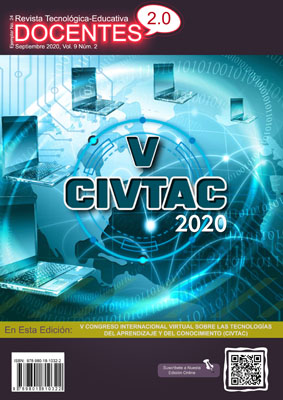The Influence of Ausubel’s Significant Learning on the Development of Rodari's Creative Writing Techniques
 DOI:
https://doi.org/10.37843/rted.v9i2.149
DOI:
https://doi.org/10.37843/rted.v9i2.149
Main Article Content
Abstract
The research was based on the study of Ausubel meaningful learning, applying Rodari's writing techniques. The terms literary production, and creative process, are not well known in school environments. The objective of the research was to analyze the influence of Ausubel's (1963) significant learning in the development of Rodari's (1999) writing techniques with first-semester students of Social Communication - University of Pamplona. For this purpose, a bibliographic review was carried out on the relevant aspects of the theory studied, as well as the works in the international, national and regional fields, which were very useful for the methodological design, the approach of the strategy and the analysis. From the results. The type of research was qualitative with the phenomenological method, this research begins with a diagnostic stage where it was possible to establish a study population had misconceptions about literary creation, prejudices at the time of writing that prevented them from generating a creative process. After applying the information gathering techniques, after doing the analysis of the categories, it was concluded that the implementation of pedagogical strategies for meaningful learning in G. Rodari's creation techniques allows the construction of knowledge and the development of writing skills. literary in the student where he develops learning in the construction of texts through the management of techniques that enhance creativity.
Downloads
Metrics
Article Details

This work is licensed under a Creative Commons Attribution-NonCommercial-NoDerivatives 4.0 International License.
Those authors who have publications in our journal accept the following terms:
- When a work is accepted for publication, the author retains rights of reproduction, distribution of his/her article for exploitation in all countries of the world in the format provided by our magazine and any other magnetic medium, optical, and digital.
- Authors will retain their copyright and guarantee the journal the right first to publish their work, which will be simultaneously subject to the Creative Commons Acknowledgment License (Attribution-NonCommercial-NoDerivatives 4.0 International (CC BY-NC-ND 4.0)). That allows third parties to copy and redistribute the material in any medium or format, under the following conditions: Acknowledgment - You must properly acknowledge authorship, provide a link to the license, and indicate if any changes have been made. You may do so in any reasonable way, but not in a way that suggests you have the licensor's endorsement or receive it for your use. NonCommercial - You may not use the material for a commercial purpose. NoDerivatives - If you remix, transform, or build from the material, you cannot broadcast the modified material. There are no additional restrictions - You cannot apply legal terms or technological measures that legally restrict you from doing what the license allows.
- Authors may adopt other non-exclusive license agreements to distribute the published version of the work (e.g., deposit it in an institutional archive or publish it in a monographic volume) provided that the initial publication in this journal is indicated.
- Authors are allowed and recommended to disseminate their work through the Internet (e.g., in institutional telematic archives, repositories, libraries, or their website), producing exciting exchanges and increasing the published work's citations.
- Request of withdrawal an article has to be done in writing by the author to the Editor, becoming effective after a written response from the Editor. For this purpose, the author or authors will send correspondence via e-mail: [email protected].
- The author will not receive financial compensation for the publication of his work.
- All Docentes 2.0 Journal publications are under the Open Journal System (OJS) platform at: https://ojs.docentes20.com/.
References
Ausubel (1963). The Psychology of Meaningful Verbal Learning. Congreso Phi, Delta, Kappa.
Cáñaz (2015). Ensayo académico. Importancia del juego en el proceso de lecto escritura de niños de 6 a 7 años. Recuperado de: http://dspace.uhemisferios.edu.ec:8080/xmlui/bitstream/handle/123456789/209/tesis%20final%20corregida.pdf?sequence=1&isAllowed=y
Cassany. D. (1997). Describir el escribir. Cómo se aprende a escribir. Anagrama.
Contursi, M. E. & Ferro, F. (2000). La narración usos y teorías. p. 76.
De Dios-Menéndez, V. (1980) Entrevista a Eva Díaz Riobello Microtextualidades. Revista Internacional de microrrelato y minificción. N. 2, pp. 132-137.
Domínguez Y.& J. Guillermo (2002). ¿Por qué no escriben textos los estudiantes? (Parte1). Revista del Centro de Investigación. Universidad La Salle, 5 (19), 85-98. ISSN: 1405-6690. Recuperado de: https://www.redalyc.org/articulo.oa?id=342/34251911
Guillen, G. (2020). La pedagogía de la imagen como forma de promover el aprendizaje significativo dentro del aula. Revista Tecnológica-Educativa Docentes 2.0, 9(1), 96-108. https://doi.org/10.37843/rted.v9i1.90
Hernández-Sampieri, R., Fernández-Collado, C., & Baptista-Lucio, P. (2006). Metodología de la investigación (4th ed.). McGraw-Hill.
Moreira, M. (1997). Aprendizaje significativo: un concepto subyacente. Instituto de Física Porto Alegre, RS, Brasil 1997.
Niño (2011). Competencias en la comunicación. Hacia las prácticas del discurso. Ecoe Ediciones.
Novalis (1978). Fragmentos y anotaciones sobre poesía y filosofía traducción de Nicolás Trujillo Osorio. Cuadro de tiza ediciones-Chile.
Orrantia, M. (2012). La escritura creativa en Colombia. Literatura: Teoría, Historia, Crítica. 14 (1), 287-301. Recuperado de: http://www.scielo.org.co/scielo.php?script=sci_arttext&pid=S0123-59312012000100014&lng=en&tlng=es.
Penacc. D. (2006). Como una novela. Grupo Editorial Norma.
Rodary. G. (1999). Gramática de la fantasía. Introducción al arte de contar historias. Panamericana.
Rodríguez-Gómez, G., Gil-Flores, J., García-Jiménez, E. (1996). Metodología de la investigación cualitativa. Aljibe.
Taylor & Bogdan (1984). Introducción a los métodos cualitativos de investigación. Paidós.
Vásquez-Rodríguez, F. (1995). Signo y Pensamiento. El oficio de escribir. PP15-24 Recuperado de: https://www.javeriana.edu.co/signoyp/pdf/2602.pdf






